- Home
- John Everson
The Pumpkin Man Page 3
The Pumpkin Man Read online
Page 3
Today I called George home from the market for a bit of play. He thought I was just aching for him, and I let him think that—men are happier when they feel like we’re starving for their thrusts and groans—but I found this entry in an old book from a plantation voodoo priestess in Georgia and I’ve been anxious to try it. I lay in bed and feigned exhaustion when he finished, but as soon as the front screen slammed I moved to the bathroom to gather what he’d given.
Yesterday I gathered the spider plant leaves and the fish. This morning I visited the Muldaurs and bought two hens. The full ritual calls for a fire with the bones of an innocent at the hottest point of its core. I don’t know if an innocent animal will do, but it can’t hurt to try. I’m only going to use the result to improve our garden this season.
I’ve set the fire pit in the backyard with the bones of one of the chickens and some white birch logs. The next step is to combine the fish eyes in a broth of freshly blooded fowl, the consummated secretions of a lover (hence my tryst today) and the spider plant. The whole mess must boil from dusk to midnight, and only then should the words be said and the circle danced around to invoke the . . .
Jenn glanced up from the journal with images of her silver-haired aunt dancing naked around a campfire through the California night and shivered. The picture in her head was ludicrous. It was not a picture she wanted to maintain. She peered out at the class, who were mostly quiet and reading. A couple paper-ball fights were going on surreptitiously in back, but she ignored them. Then she looked at Rudy’s desk. The chair was still empty and the puddle still there.
Bastard! she fumed. He’d never come back. You’d think she’d have learned after all these years. Boys like Rudy played you to get exactly what they wanted and then . . .
She took a deep breath and stilled her anger. It was her own fault for giving in. She should have made him sit there the whole period, or better yet, written him a detention. She was too easy on these kids and knew it.
The end-of-period bell rang, and the room emptied faster than a fire drill. But when they were all gone, there was still someone standing in the doorway: Sister Beatrice.
Crap. Had the nun found out she’d lost Rudy? What kind of trouble had the delinquent gotten himself—and now, consequently, her—into?
Sister Beatrice walked slowly into the classroom, her eyes surveying all as if considering how to redecorate. Or demolish. Jennica shrank a little at her approach. She might have moved to the front of the class, but she would always be a little afraid of nuns. And, unlike most, Sister Beatrice still wore her black-and-white habit.
“How are you doing, Jennica?” the older woman asked.
Jenn shrugged. “Okay, I guess.”
“I saw that the police are still looking for clues. It was on the news again last night.”
Jenn nodded. “They don’t seem to be getting anywhere.”
The sister put a hand on her shoulder and squeezed. “Our prayers are with you, always.”
Jenn smiled.
“Please ask them to keep the name of your school out of the reports when they mention you, though. If you could,” the sister added.
So, the PR aspect of her tragedy, not concern, was the real reason for the sister’s visit.
“We have been getting calls from parents concerned that the person who did this horrible thing to your father might be a threat to their children at Holy Name—because he might be after you, they think. I’ve told them that there is absolutely nothing to worry about, that you’re not in any trouble. So there’s no danger. But . . .”
Jenn almost choked. “I’ll do what I can,” she promised, and looked away from the principal to begin gathering up her papers. Leave it to Sister Beatrice to show the compassion of a killer.
“Thank you,” the sister replied. Turning to leave, she was almost out of the room before she thought to offer, “God bless.”
CHAPTER
FOUR
Richard Murphy had not had the winds of fortune at his back. Aside from the clothes in his closet and the run-down furniture Jennica had abdicated, the sum total left in his will after paying funeral expenses came to a few hundred dollars. A lifetime of working, and he had never managed to save much of anything. The few stocks he’d bought had gone south, and the life insurance policy he’d held for twenty years had been allowed to lapse six months before. She could see him crinkling his brow and shaking his head in confusion over that one.
“I guess I just got busy,” he’d say. “I didn’t mean to let it go.” Words to die by.
Jennica visited the lawyer’s office on Saturday afternoon to receive the final documents, along with the only substantive thing that she would ever see again from her father. And it hadn’t even been his, really. It was the deed to a house in California. Her aunt Meredith’s place. A couple weeks ago she’d barely known anything about the woman; now she was studying her aunt’s private journal and taking possession (at least on paper) of the woman’s house. Life (and death) moved in strange ways.
At home, Jenn picked up a sheaf of mail from the tiny silver box in the apartment building foyer and hurried up the twisting stairs to the fourth floor. “Kirstin?” she called. “You home?”
Something that vaguely resembled her friend and fellow Holy Name teacher came plodding out of the kitchen holding a package of frozen vegetables to her head with one hand and pressing a terry cloth robe closed with the other.
“Nice ice pack,” Jenn observed. “We have to eat those peas, you know.”
Kirstin flopped heavily on the couch and groaned. “I told you to come to the Tender Trap last night.”
“Mmm-hmmm. And you’re a good example of why I didn’t.”
“You missed a lot of free tequila. The boys were generous.”
Normally, to look at her, you’d think Kirstin was the ultimate sorority girl: blonde and blue-eyed, busty and giddy. In so many ways, Jennica’s opposite. But the two had been best friends for years. Right now, though, with no makeup, hair askew and a pale, drawn face, Kirstin did not maintain her usual allure.
Jenn shook her head. “I don’t think I missed anything at all.” She dropped the pile of mail and papers on the coffee table and fished out a manila envelope. “Anyway, I needed to get this stuff done.” She pulled a sheaf of legal papers from the envelope and held them out for Kirstin to see. “Look! I’m now the proud owner of a house in River’s End, California! Wherever that is.”
“Cool,” Kirstin said. “When are we going?”
“Going?” Jenn echoed. “We’re not going. My dad went out there, cleaned up some of my aunt’s things and found someone to take care of the place. He was trying to have it rented out as a furnished cottage, but so far nobody’s taken the bait. Not in three months. I don’t really want to be a landlord, so I’ll probably just sell it.”
Kirstin grimaced. “Well, I think you should at least go and check the place out before you dump it. You’ve never been, right?”
“No,” Jenn said. “I think the last time I saw Meredith was when Mom died—and she came up here.”
For a second, Kirstin’s face lit up. “I smell a Spring Break trip!” Then a frown appeared, and she pressed the bag of frozen peas and carrots harder to her forehead.
Jennica sighed. “Well, number one, I don’t have money for a vacation right now, and two, I don’t think the place is what you’re thinking. It’s in northern California, so you can get rid of all those thoughts of tanned hunks and surfboards. I don’t think it’s exactly Malibu sun central.”
Kirstin pouted. “California boys,” she said longingly.
Jenn rolled her eyes and laughed, picked up her mail and started toward her bedroom. “You’re incorrigible.”
“Could you bring me the aspirin?” Kirstin called weakly. “And water?”
They stayed in that night, and Jennica went to bed early. Before she slept, though, she pulled out Meredith’s journal and read a few more pages of the old woman’s careful, thin and slanted scrawl. She t
urned to a page more wrinkled and watermarked than the others in the first part of the book and realized how it had probably gotten so damaged: It was a recipe of some kind. Meredith must have kept it open on the counter as she cooked.
Three sprigs of liverwort
Two gull wings
One dragonfly
Three leaves of spotted sage
One catnip leaf
One thimble bat’s blood
Say the words and stir this concoction over an open flame of Mountain Ash until boiling. Cover the pot and wait ninety seconds. Remove from the flame, open the lid and breathe the steam in deeply.
But, what was it a recipe for? And what were the words? There was no explanation or title. Meredith’s book was all like that; her aunt would go on for a few paragraphs and tell a story, and then suddenly would appear a poem, or a recipe, or a spell. There were hand-drawn maps with stars and circles, and geometric patterns woven into a lattice that looked both ornate and fraught with deeper meaning. And there were pages folded, pages ripped out. The whole thing was like a map of her days, a concrete representation of life’s unpredictable left turns and sudden turnabouts. You never knew where the pages would go next.
Something about this diary attracted her as much as its ridiculous talk of “magic” repelled her. It was like being given a free pass to someone’s most secret, if insane, thoughts. You’d never spy without permission, but . . . well, the book was hers now. Wasn’t that permission enough?
Jennica closed the book and turned off the light. In moments, she was asleep.
Or was she? She was in her aunt’s kitchen. Only, it looked brighter, newer than the room she had inherited. But she wasn’t there alone. An old woman stood near the sink and smiled, her lips parting ever so slightly. She shook her head, holding out her hand, palm up. “Not now,” she said to someone unseen.
Turning, the woman picked up a large knife and began chopping something on the counter. Jennica couldn’t see what she was chopping because, suddenly, in a transition that only dreams can have, she now looked through the woman’s eyes, and the woman was looking out her kitchen window at blue skies and broad fields of brown grass. There were no other houses in sight, though nearby a well-kept garden interrupted the wild stretch of prairie grass. Jennica could see red tomatoes hung in thick bunches from staked vines, and just beyond was a pumpkin patch where dozens of orange globes lay on their sides or stood up straight.
On the counter to her left, a pumpkin was split in half, glistening seeds dripping like hard creamy tears into the sink.
The chopping stopped. Jennica looked down and saw blood on the old woman’s gnarled hands. But it wasn’t her blood. On the wooden chopping block lay the quartered remains of a blackbird, its feathers darkened further by the spray of its own blood. The woman lifted pieces of its head, feet and chest and dropped them into a black pot that gasped heavy steam.
Then Jennica was outside the woman again, suddenly staring at her eye to eye, and the old woman reached into the steaming pot with a long wooden spoon and brought out a sample of the pieces. She held out the black and orange gruel for Jennica to taste, grinning and pushing the spoon toward her lips—
“No!” Jennica sat bolt upright in her bed. Her heart pounded as she glanced around and saw the faint gleam of moonlight pushing through the familiar curtains, and the pile of dirty laundry she’d left next to her dresser on the floor. This was her room, not the kitchen of a witch, but somehow that knowledge didn’t give comfort. She felt as if an old woman still lurked in the shadows, waiting to feed her the blood of a raven.
Slowly she lay back, but it was a long time before she slept again.
The next morning, after ignoring the light slanting across her face for a couple hours, Jennica finally rolled out from under the sheets and stepped out of bed. She moved slowly, but there was no reason to hurry. It was Sunday, and she hadn’t set an alarm.
Her feet felt something sticky on the floor, and she stepped quickly to the side—only to come down on something hard and squishy.
“What the . . . ?” she began, and leaped away from the bed. Dropping to a crouch, she found three small orange triangles at the foot of her bed. The sticky thing she’d first stepped on was a strand of slimy pulp that she’d ground into the throw rug with her heel.
Pumpkins. The triangles were pumpkin pieces.
The hair on the back of her neck stood up. She lifted a cold pumpkin wedge and stepped into the hall. “Kirstin?” she called, but her voice echoed and died without answer. “Why are there bits of pumpkin in my room?”
She crept down the narrow hall, but the apartment remained silent. Her roommate had apparently already left. Looking behind every door and in every closet, Jennica walked the apartment until she was sure it was empty. She checked the lock on the front door, which was bolted. They had found pumpkin pieces in her dad’s apartment—that was about all the cops had told her. And, of course, she had found one herself, lodged against a baseboard.
She stared at the orange triangle, rolling it over in her hand. Where did you even get pumpkins in the springtime, she thought. Then she set it on the table and washed her hands. But the warmth of the water couldn’t take away the chill she felt. Someone had been here. In her house. Standing at the foot of her bed. The thought of someone standing there, in her room, staring at her as she slept . . .
“Oh God,” she whispered.
What if the Holy Name parents were right and the killer was coming for her, too?
CHAPTER
FIVE
The knife moved with great speed. It cut easily through the man’s thick skin, carving a precise line through the flesh. The carver sniffed, and a moment later sniffed again with obvious irritation. He had a chronic nasal problem that made his detailed carving work ever more challenging. But he kept on without stopping, not losing a beat as he wiped the dampness from his nose and upper lip with the back of his shirtsleeve, never looking down, struggling not to break focus.
He reached out to pull one of the subject’s eyelids open. It held that way, the white orb beneath swiveling crazily, pupil wide and black. The face wore a look of abject terror. The earlier disengagement of the model’s vocal cords kept the carving room quiet, however, as the carver preferred to work in silence. He could brook no distractions at this stage if he was to capture the essence of the man with his knives before the man’s life fled. So he was doubly irritated when his sinuses suddenly hitched up, trembled, and then he let out a series of six rapid-fire sneezes. Again he wiped his face with an increasingly wet shirtsleeve and continued his work.
The carver had a kit of knives that he used, like the OR tray of a surgeon. He kept them in a black leather case that folded outward to reveal differently shaped blades, each prized instrument tucked into its own sleeve. His fingers used each as if it were an extension of him.
His knives were relentless. Piece by piece, the face of the victim took shape in the pumpkin beside him. First he dipped his knife into the model’s face, sampling the essence of the man with his blade, drawing something of the model into his tool. Then he moved his fingers to the pumpkin and slid the wet blade into the hard shell, carving the image of the man into the gourd, with the man’s blood as lubricant, and his lost soul as the bridge between flesh and portrait. The carver cut first with a long, curved edge, outlining the form, marking the way. Then he set the opener to the side and refined the incision with a tiny wire-thin implement: a shaper. His hands moved back and forth from pumpkin to knife kit in a blur. Time was short. Some blades were hooked, with edges on both sides. Others stabbed. Still others shaved. They all worked together to reveal the face beneath the surface.
After three decades of carving, nobody could match him in speed or artistry. In years past, he had performed his carving magic for audiences at festivals and carnivals and even private parties, albeit with less terminal consequences. He was like a sidewalk caricature sketch man, turning pumpkins into the garish portraits of boys and girls, men and
women, even dogs and cats. It was almost as if he imprinted their souls in the gourds, his viewers had marveled. But they also shivered.
Why did they shiver? It was creepy to take your pumpkin home, prop it in the window and then later walk into your living room and see yourself staring back, lit by the flickering tremor of a candle flame. And, moms got a frightened feeling when they watched him duplicate little Billy or Sarah on the skin of a twenty-pound pumpkin. They cringed when he touched their children, though he did so gently with one hand while the other stabbed the gourd. He always touched his subjects as he worked. The connection helped him pour something of them into his art. It made his carvings true. It almost gave them breath.
But, that had been then. This was now, and now he had to work fast. And to work fast, he had to do more than touch his subjects with a finger. No . . . he stabbed the knives into them, and carried the blood over to the pumpkin as he re-created their faces on orange canvas.
The carver sneezed and impatiently honked to clear his throat as he sliced the knife deep into the man’s cheek, drawing out the essence with a deft slice and then removing the knife from the heat of the dying face to transfer the model’s essence to the pumpkin. The flicker of energy in the man’s glare was fading. With short, tiny slices the carver slit the vinyl-like skin in the pumpkin to form the tiny breaks in the man’s smile. The man’s pumpkin-cut smile.

 The Devil's Equinox
The Devil's Equinox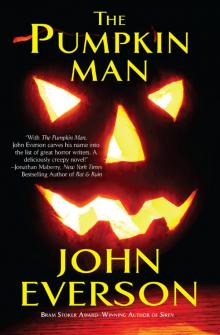 The Pumpkin Man
The Pumpkin Man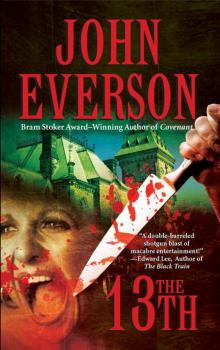 The 13th
The 13th Vigilantes of Love
Vigilantes of Love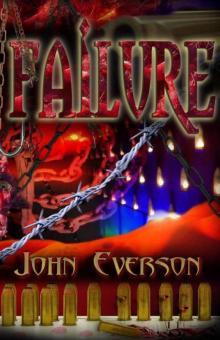 Failure
Failure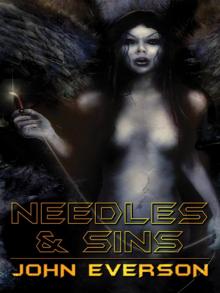 Needles & Sins
Needles & Sins Sacrificing Virgins
Sacrificing Virgins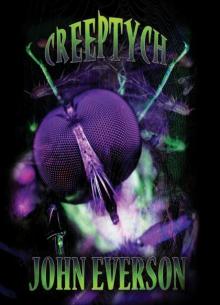 Creeptych
Creeptych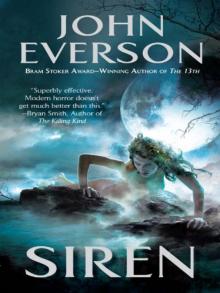 Siren
Siren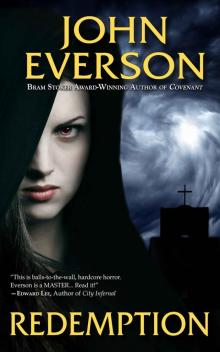 Redemption (Covenant Book 3)
Redemption (Covenant Book 3)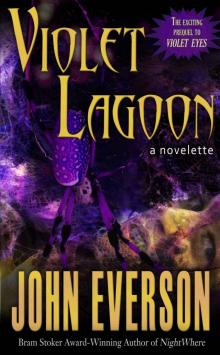 Violet Lagoon
Violet Lagoon Covenant
Covenant The House by the Cemetery
The House by the Cemetery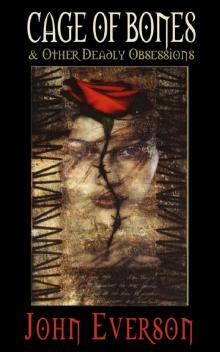 Cage of Bones & Other Deadly Obsessions
Cage of Bones & Other Deadly Obsessions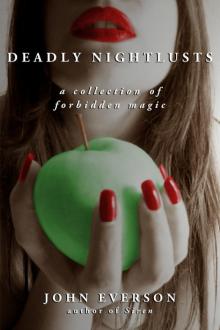 Deadly Nightlusts
Deadly Nightlusts NightWhere
NightWhere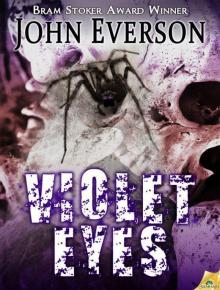 Violet Eyes
Violet Eyes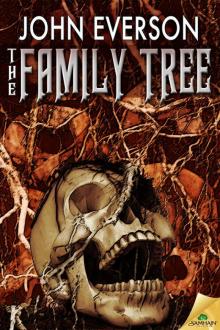 The Family Tree
The Family Tree